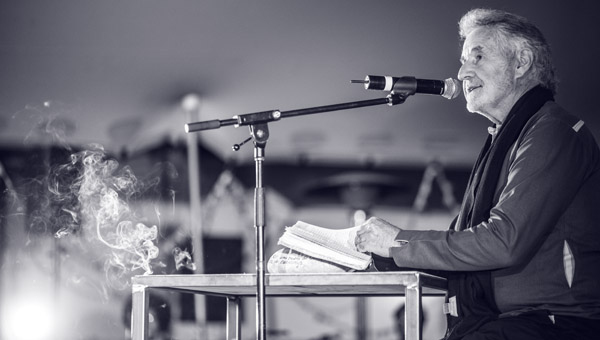
Breyten Breytenbach - Photos: Retha Ferguson
Dancing in Other Words, 10-11 May 2013, Spier, Stellenbsoch.
JONATHAN AMID
“Skipping”, “swaying”, “hopping”, “twirling”. Dancing in other words. Curated by Breyten Breytenbach and choreographed by Marthinus Basson, tonight’s event brings together a diverse collective of celebrated international and local poetic voices: Bill Dodd from Italy, Marlene Van Niekerk, Dominique Botha and Petra Müller (all from SA), Ko Un from South Korea and Tomaž Šalamun from Slovenia. The festival is the culmination of a poetry caravan of alternating exuberance and restraint, intimacy, naked emotion and often breathtaking wordplay and the spirit of the conversation we’re about to witness is captured in the intellectual, spiritual and performative dimensions of dancing in other words. After months of anticipation I can barely contain my excitement as I settle in a dense audience, eager to be dazzled.
To my mind, poetry has always been a form of expression that lives: more than mere words on a page, poetry comes alive in the ways in which self and world are spoken into being, made, re-made, fashioned, re-fashioned. If literature offers us a particular refraction of the world, showing us what a world could look, feel and smell like through the lens of a single author, poetry at its most immediate arguably feels more like a reflection, a momentary, fleeting glimpse into a realm of an intensely personal truth. This is precisely what the poets in tonight’s line-up offer their partners in conversation (read: the audience).
Before I set forth giving my impressions of an event far richer and more evocative than the words of any after-the-fact report could attempt to do justice, a small caveat to set the tone: This event, as conversations with Breytenbach and Basson have disclosed, is a public event only in its husk and shell. Although an audience is present for the Friday and Saturday poetry readings (there is also dance and a magician to add to the atmosphere), the animating impulse of the poetry caravan is a group of eleven poets spending the week living together, in conversation with one another. With Breytenbach’s aphorism, “poetry is the dreaming vein in the body of society” as the organising axiom, what capillary surges and swells, gushes and rushes, could be set free from such a potent passageway?
A majestic reading from Breytenbach about “the stones of Utopia” sets the tone. While Breytenbach’s reading offers the kind of shifting panorama and pointed political inflections about the “pestilence of power” the audience has come to expect, his cadence in moments that speak to the allusive potential of the stone and wind is particularly rich. When is picking up a stone not a political act, asks Breytenbach, as he maps topographies of self, brought into relief when acting “in defiance against time?” Indeed an indelible opening to the programme.
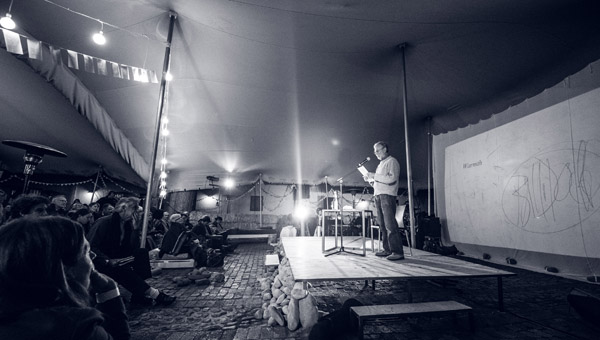
Bill Dodd
Bill Dodd takes the stage after Breyten’s invocation that the “dancing” should begin. A gentle, temperate presence onstage, Bill declares that it’s his first time in SA. The warmth, keenly felt observational quality and tenderness when delivering a selection of his poems has the appreciative audience attentive to every last detail. Not so much dancing as skipping from stone to stone, poems such as “Cordless”, “Armchair” and “Opening up” (about a man’s heart on a table, no less) evidence a delightfully playful air of grace and sensuality, filled with brio and bite.
If Bill Dodd was the fleet of foot man of middle age letting the inner child loose, Petra Müller’s stark, stentorian delivery (of almost Wagnerian intensity) soon made the evening chills all the more evident. Müller’s elegiac, wrenching poems on the night such as “Vrouevegter Afghanistan”, “First Love”, “Foetus”, “Distance” and “Death of a poet (Paul Celan)” illuminated a most affecting dance with death.
This dance with death is not simply a case of dealing with the ending of a life, but a nod to the unmaking of the world when the body ceases to function. Although there are moments where Müller’s delivery becomes grinding rather than remaining grandiose, her operatic and emotive dances with loss and regret are nothing if not memorable.
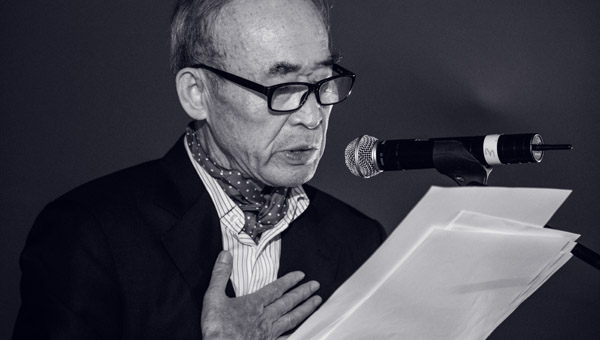
Ko Un
Little could have prepared me for the unbridled light and delight that follows after the darkness of tone and subject matter from Müller. Ko Un, a South Korean national and eighty years of age, takes centre stage, and for the better part of an hour proceeds to enrapture and enthrall what must be every last heart and mind in the audience. Ko is a bundle of raw energy as he offers up short, sharp, sensual shards that coalesce and melt into a kaleidoscopic mosaic of colour and shade.
First Dominique Botha and later Carolyn Forché read translations after every individual delivery by Ko, and I’m quietly awestruck by the unrelenting verve and perspicacity revealed by the English translations, by the luminescence and infectious spirit of togetherness for all to see. Ko’s dancing in other words exemplify an ethos of entanglement and clarity of vision that few can resist, and his readings deliver a rousing response from the audience. “That’s how you do it” runs through my head as the buzz of excitement flows from one circuit to the next in my body.
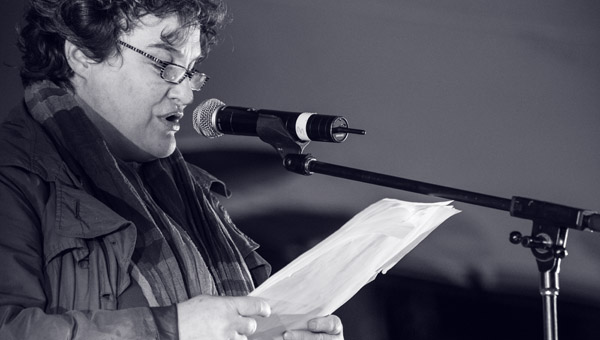
Marlene van Niekerk
I had the pleasure of seeing the next poet in action, Marlene van Niekerk, at an InZync poetry event a year and some months ago. On that occasion she blew my mind with her intensely lyrical animal poems, and tonight she is no less impressive.
I have been struck by the similarities between Marlene’s work and that of Seamus Heaney before, the dexterity, the musicality, the textures and the rhythms, and tonight I can’t help but to thunderously applaud her poetry’s acuity and incredible beauty. Her words have never sounded more heartfelt and resonated more clearly than they do tonight. It is as if she holds a golden thread, pulling the audience ever closer to her breast.
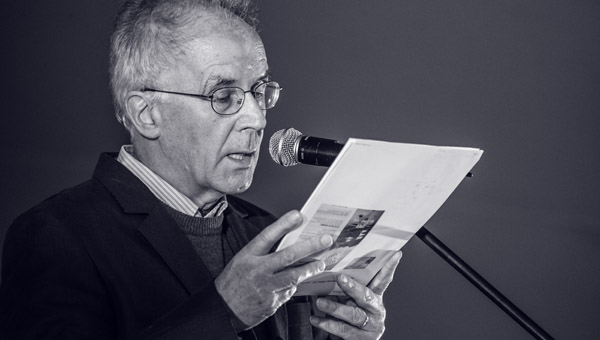
Tomaž Šalamun
It’s hard to describe how utterly singular an experience it is listening to Slovenia’s Tomaž Šalamun. He is the final poet onstage, and what he delivers is as lyrical as it is in contrast to the preceding artists.
Šalamun has a tongue of lapping water when he recites lines of poetry in his native tongue and in English (as he does for most of his performance), and his poetry covers a wide ambit of experiential dimensions. Most striking to me is the way in which he is able to irradiate a creatureliness and mortality in moments of tremendous intimacy, and how these moments transpire against a backdrop of glacial self-awareness and pure adoration. Šalamun is a love poet of the most unusual kind, offering visions of a stoning of the self and the “packing” of stones to form an altar at the feet of the beloved. The heartbeat of a titanic associative machine pumps ever so rapidly within his coolly gorgeous poems.
Soothing interpretative dances and impressive magic tricks book-end the readings tonight, and Ina Wintericht and her dancers and magician Geon Nel deserve special mention, along with the illustrations of Colijn Strydom, quite literally dancing into being through watercolour brushstrokes as the poets “danced” on stage: all in all a fabulous fabulation, Marthinus Basson.
After bearing witness to the joys and sorrows of dancing, solo dancing and dancing with partners, dancing as a creative act and a form of dreaming awake, my eyes light up. It dawns on me that I’ve been privileged enough to sit in on a jamboree, a quilting together of the words and voices of the finest literary practitioners and warmest hearts. It dawns that the putting of pen to paper can lead to a bonfire, one where the embers rise ever closer to the night sky, and the stars keep watch over the place where Heitsi-eibib is buried.
 SLiPStellenbosch Literary Project
SLiPStellenbosch Literary Project